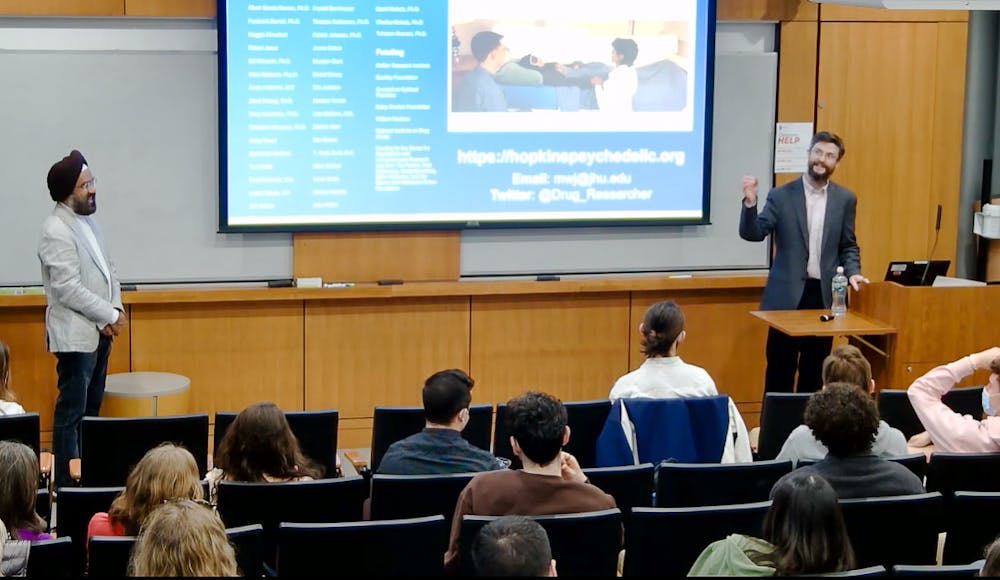Matthew Johnson, professor of psychedelics and consciousness at Johns Hopkins University, visited campus last Friday to present his talk “Classic Psychedelics in Addiction Treatment” as part of the University’s Distinguished Visiting Scholar Series.
The event was hosted by the Center for Addiction and Disease Risk Exacerbation, which is a part of the Center for Alcohol and Addiction Studies at the School of Public Health.
CADRE is focused on understanding mechanisms underlying “the association between substance use and chronic disease,” Jennifer Tidey, director of the Clinical Laboratory Core of CADRE and professor of behavioral and social sciences, told The Herald. Tidey said she hoped inviting an “internationally-renowned” scholar in the field of addiction research would inspire and inform researchers at Brown.
The visiting scholar series “provides a forum in which experts can share their latest and greatest work to not only inspire people in the CADRE, but also to bring others up to speed” on topics surrounding substance use and chronic disease, said Peter Monti, director of CADRE and director of the Center for Alcohol and Addiction Studies.
“Johnson is a behavioral pharmacologist who is one of the world’s most published scientists on the effects of psychedelic drugs on human behavior,” Tidey said.
The event began with Johnson giving an overview of the biological mechanisms behind psychedelics.
Psilocybin — the psychedelic compound produced by the fungi commonly referred to as magic mushrooms — belongs to the group of “classic psychedelics,” which also includes LSD, mescaline and DMT, Johnson said at the event.
The classic psychedelics are grouped this way because they all bind to a neural receptor called 5-HT2A, which is involved in hallucinogenic activity in the brain, he added.
“The history and prehistory of (psychedelics) is absolutely fascinating,” Johnson said. Archeological evidence suggests there was ceremonial usage of psychedelic mushrooms from a few hundred to several thousand years ago, according to Johnson.
The “first hayday of psychedelic research” spanned from the 1940s to the 1970s, Johnson said in the talk. Researchers from this era found promising data on the ability of psychedelics to treat cancer-related distress and alcoholism, he added.
After this followed “the dark ages” — a period of psychedelic research dormancy and controversy that lasted until the early 2000s, according to Johnson.
One of Johnson’s pilot studies from 2014 focused on the feasibility and safety of using psilocybin to aid in smoking cessation. While the data was preliminary and “should be taken with a huge grain of salt,” the pilot study presented “encouraging” results showing that over 50% of participants had not used a single cigarette for 12 months after their target quit date, Johnson said.
The “big question in the field” is what the mechanisms behind psychedelics treating addiction are, Johnson said. Addiction is “associated with a narrow behavioral and mental repertoire” and “loosely speaking, it seems like psychedelics can blast people out of” their addiction, he added.
Looking to the future, Johnson described several upcoming studies examining the role of psychedelics in treating opioid addiction, post-traumatic stress disorder and chronic pain.
Jasjit Ahluwalia, deputy director of the CADRE Administrative Core, wrote in an email to The Herald that he hopes audience members left the presentation with “an open mind to ideas that are not traditional” and remembering that science should inform policy.

Jared is a Senior Staff Writer for Science and Research. He is a senior from Albuquerque, New Mexico studying physiology and biotechnology. Outside of The Herald he likes to fish, ride bikes and research the role of metals in human health and disease.





